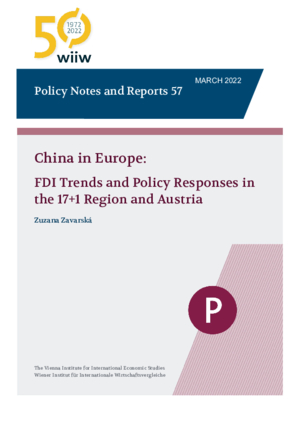China in Europe: FDI Trends and Policy Responses in the 17+1 Region and Austria
Zuzana Zavarská
wiiw Policy Note/Policy Report No. 57, March 2022
25 pages including 2 Tables and 8 Figures
Finding common ground across EU member states in responding to China’s increasingly prominent position in the global economy has thus far proven a challenge. As the EU tries to find a ‘third way’ for dealing with its most important trading partners amid heightened US-China tensions, selected countries within the CESEE region have been deepening their investment relations with China. Given these countries’ significant capital needs for economic development, and in view of the EU’s arguable neglect of parts of the region, it is hardly surprising that they would be incentivised to seek out alternative investors. In addition to managing the risks arising from debt dependencies, China’s growing position in the 17+1 countries’ energy sectors may present a possible risk area. The EU investment screening mechanism is unlikely to align strategic interests across member states in its present scope, given the deficiencies in enforcement. With Austria’s established investment presence and relative geographical proximity to the 17+1 countries, it needs to play a key role in moving the dialogue in the direction of harmonising EU investment screening mechanisms, aligning incentives through greater involvement of the Western Balkans in development financing from the EU and offering realistic EU accession prospects. The Comprehensive Agreement on Investment (CAI) would have constituted a positive step towards a mutually beneficial and competitively neutral investment relationship with China, despite its numerous shortcomings. Austria and the EU-CEE countries should therefore lean towards resumed engagement with China regarding the possible ratification of the CAI, keeping core European values in mind. The EU should prioritise proactive policies to drive growth at home, leveraging the continent’s innovation capacities, and not only rely on defensive mechanisms to keep out unwanted FDI. Ultimately, Austria should recognise and emphasise mutual respect and co-operation towards common goals among the world’s major trading blocs, despite sometimes profound differences in economic models.
Reference to wiiw databases: wiiw FDI Database
Keywords: EU, China, foreign direct investment, investment screening, investment agreements
JEL classification: F13, F21, F42
Countries covered: Albania, Austria, Bosnia and Herzegovina, Bulgaria, China, Croatia, Czechia, Estonia, Germany, Hungary, Latvia, Montenegro, North Macedonia, Poland, Romania, Serbia, Slovakia, Slovenia, United Kingdom, US
Research Areas: Macroeconomic Analysis and Policy, International Trade, Competitiveness and FDI
